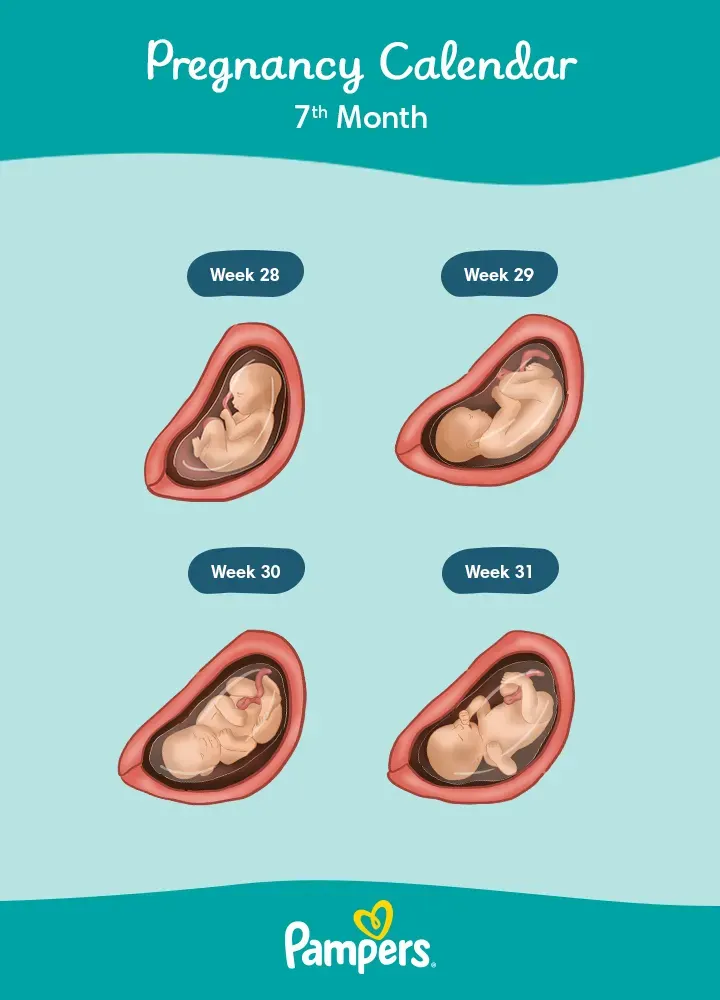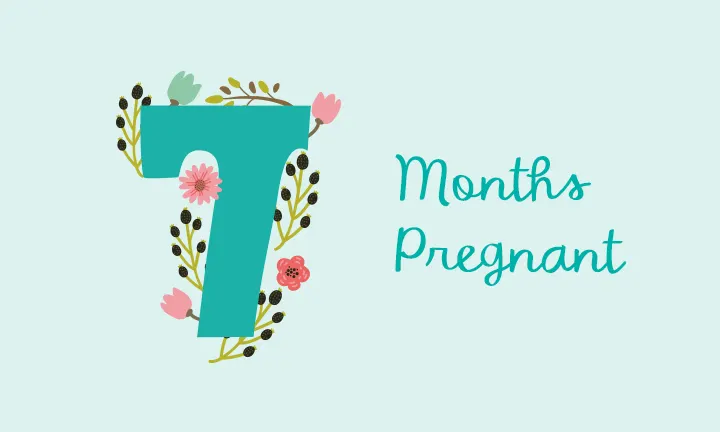7 Months Pregnant – Learn About Symptoms, Signs, Belly Size, Baby Delivery & Fetal Development
You've entered the third trimester, the final stretch of pregnancy in so many ways.
7 Months Pregnant: Common Symptoms
At this stage of the third trimester of pregnancy, it's common to feel the effects of your growing tummy and of your progressing pregnancy. Explore third trimester symptoms & remedies to ensure the well-being of mother & baby in the last stretch of pregnancy.
Back pain
Fatigue
Swollen ankles and feet
Heartburn
Stretch marks
Itchy skin
Foot and leg cramps
Frequent urination
Shortness of breath
Anxiety
Braxton Hicks contractions
Remember, everyone is different, and you may not experience all of these pregnancy symptoms. Some pregnancy symptoms that can worry mums-to-be include:
Stretch marks: At 7 months pregnant, your baby bump will be getting bigger each day. As a result, you might get stretch marks on your tummy, as well as your breasts, thighs, arms, or buttocks. Many women get these pink or reddish purple lines, but, after birth, they'll usually fade with time. Keeping a healthy third trimester pregnancy diet and gaining the right amount of weight gradually throughout the pregnancy may help reduce the likelihood of stretch marks.
Itchy skin: As your skin stretches, it might also itch. Rub soothing oils or a gentle moisturiser on your skin and bathe in warm water, as hot water can be too drying for your skin.
Seven Months Pregnant: Baby Development & Bodily Changes
Your Baby’s Development: Just after 33 weeks of pregnancy, babies often turn head-down in preparation for birth and also start to move downward, putting pressure on your bladder (bathroom, anyone?). This may take some pressure off your lungs, making it a little easier to breathe. Your baby’s bones are also beginning to harden.
The skull, however, remains softer so that the baby can pass through the birth canal more easily at 7 months pregnant. The plates of the skull slide over each other during birth, which is why some babies are born with a cone-shaped head. Don’t worry, though — the shape of your baby’s head will go back to normal within a few days.
Changes to Your Body: At 7 months pregnant, the space is getting a little snug in your uterus, and your baby might be moving less because of this. You are still likely to feel some movement each day.
Because your centre of gravity changes as your tummy grows, you might feel unsteady on your feet, so take your time while walking. As your belly expands, you might also lose the ability to bend over, and your gait might even change to support your tummy.
Your breasts will grow and become even heavier. The veins on your breasts might become more visible, and the colour of your nipples might darken.
How Big Is Your Baby When You’re 7 Months Pregnant?
So, what’s your baby’s approximate size when you’re seven months pregnant? Your baby could weigh about 2.5 pounds and measure 14 inches at this time.
What Does a Fetus Look Like at 7 Months?
Check out these illustrations for a glimpse at what your baby might look like when you’re seven months pregnant:

How Far Along Are You at 7 Months Pregnant?
At seven months pregnant, it’s generally accepted that you’re at the very beginning of the third trimester. It's a little trickier to determine how many weeks seven months pregnant is. The weeks of pregnancy don’t fit neatly into months, so seven months can begin between 25 weeks and 27 weeks pregnant and extend up to 28 to 31 weeks.
Seventh Month of Pregnancy Quick List
Rest up: It’s important to get as much rest as possible. Although you might find sleeping more difficult as your tummy grows, try sleeping on your side with pillows supporting your tummy, and place a pillow between your legs.
Find out about preterm labour: Many mums-to-be worry about premature labour and can sometimes mistake it for Braxton Hicks contractions. To help allay your fears, it might help to get familiar with the signs of premature labour, which include persistent cramps or contractions, spotting or bleeding, and lower back pain. If you’re concerned you might be in premature labour, or have any questions about what you're experiencing, explore signs and symptoms of premature labor to avoid pregnancy complications.
Talk to loved ones: With all of the pregnancy symptoms and your changing body shape, you might feel that you’ve lost control over your body. It’s an emotional time, and these feelings are normal. Try to rest and relax, talk to loved ones about how you’re feeling, and remember that you don’t have much longer to go. Also, try exploring our pregnancy calendar that will guide you through this amazing journey of early parenthood
Learn about Braxton Hicks contractions: These practice contractions are also known as "false" contractions, and you might experience several during your third trimester of pregnancy. Read more about Braxton hicks contractions & how are they different from real contractions.
Brainstorm baby names: You might have settled on a baby name, but if not try the Pampers Baby Name Generator, as it might help you land on the perfect name for your little one.
FAQs at a Glance
Try to sleep on your side with your knees bent. Place one pillow under your belly for support and another between your knees, or use one longer body pillow. Make your bedroom as relaxing as possible, and try doing something soothing each night like taking a bath or reading.
